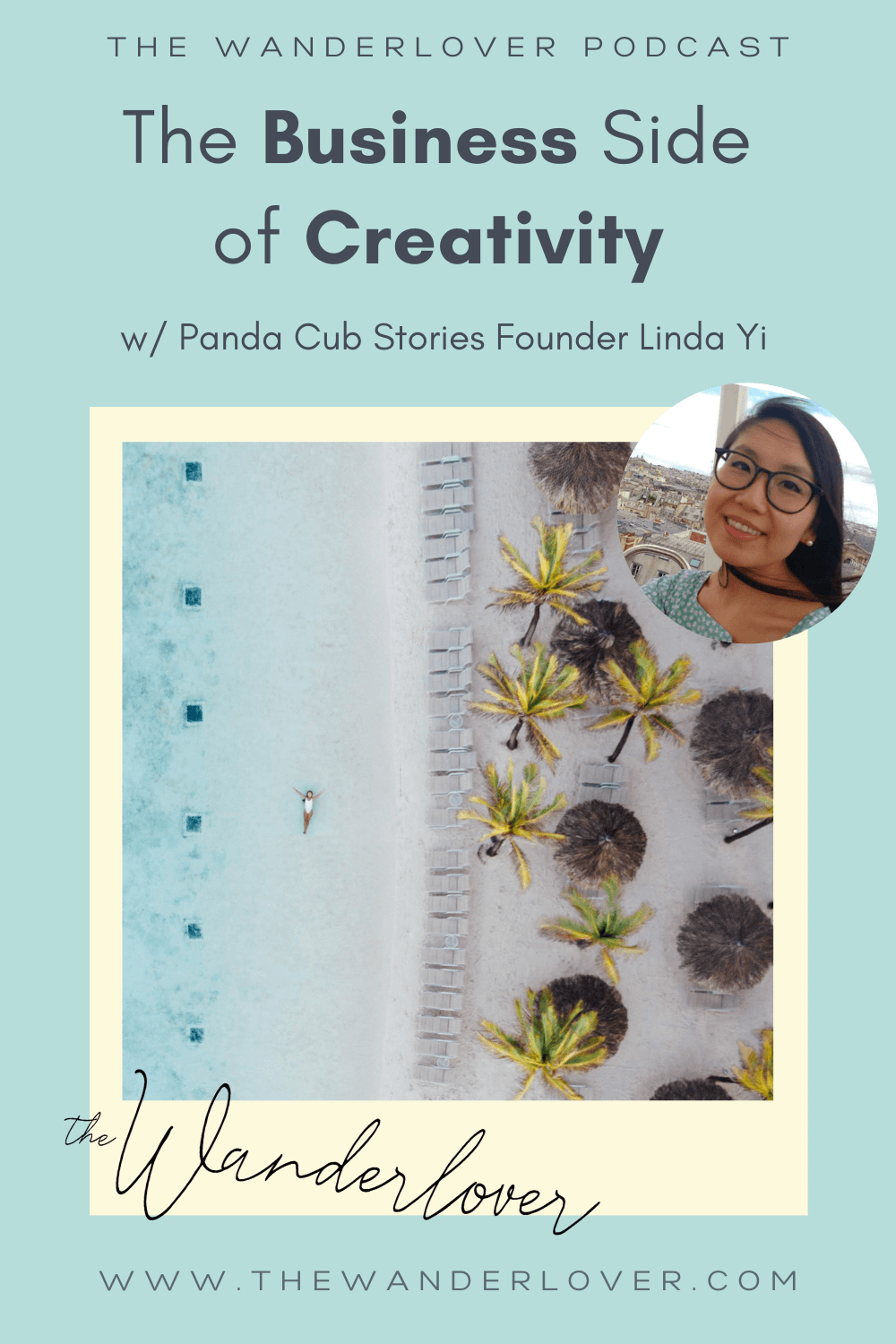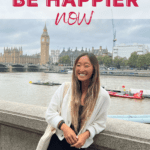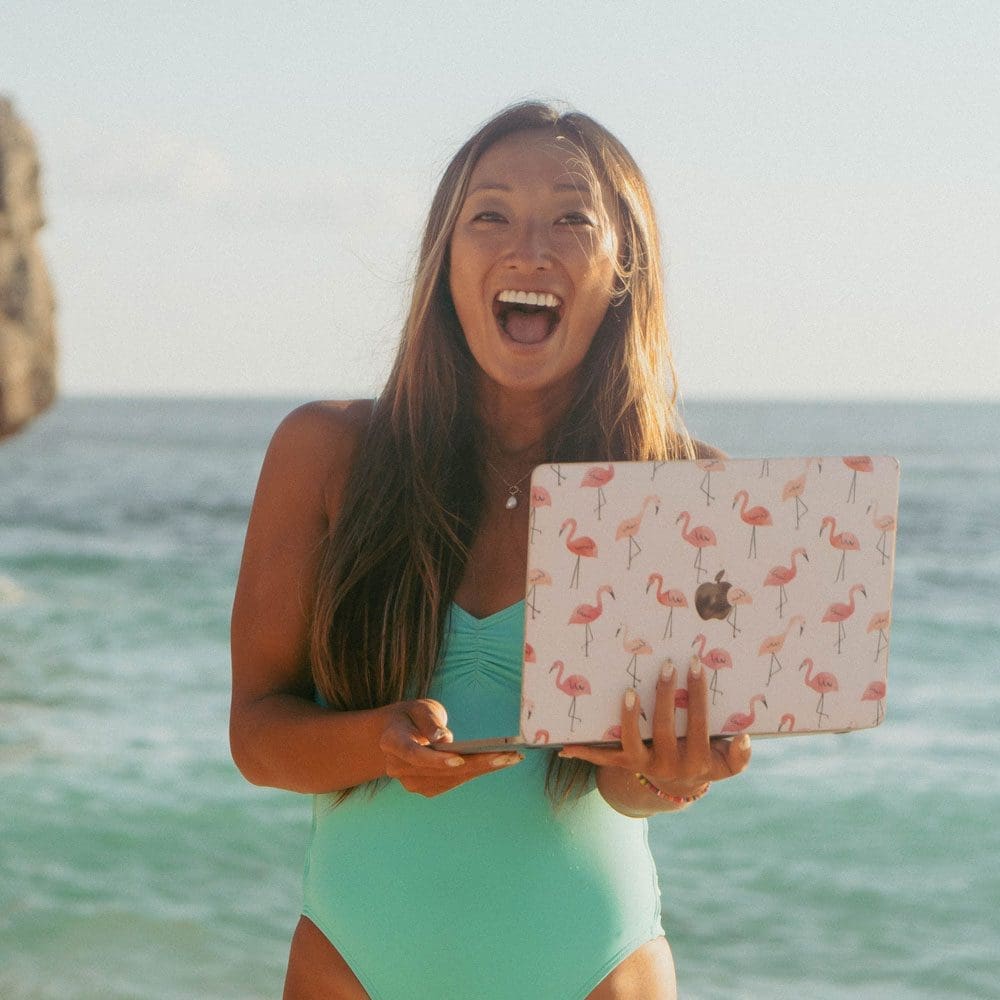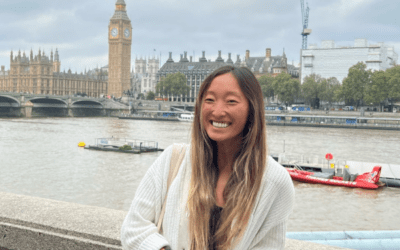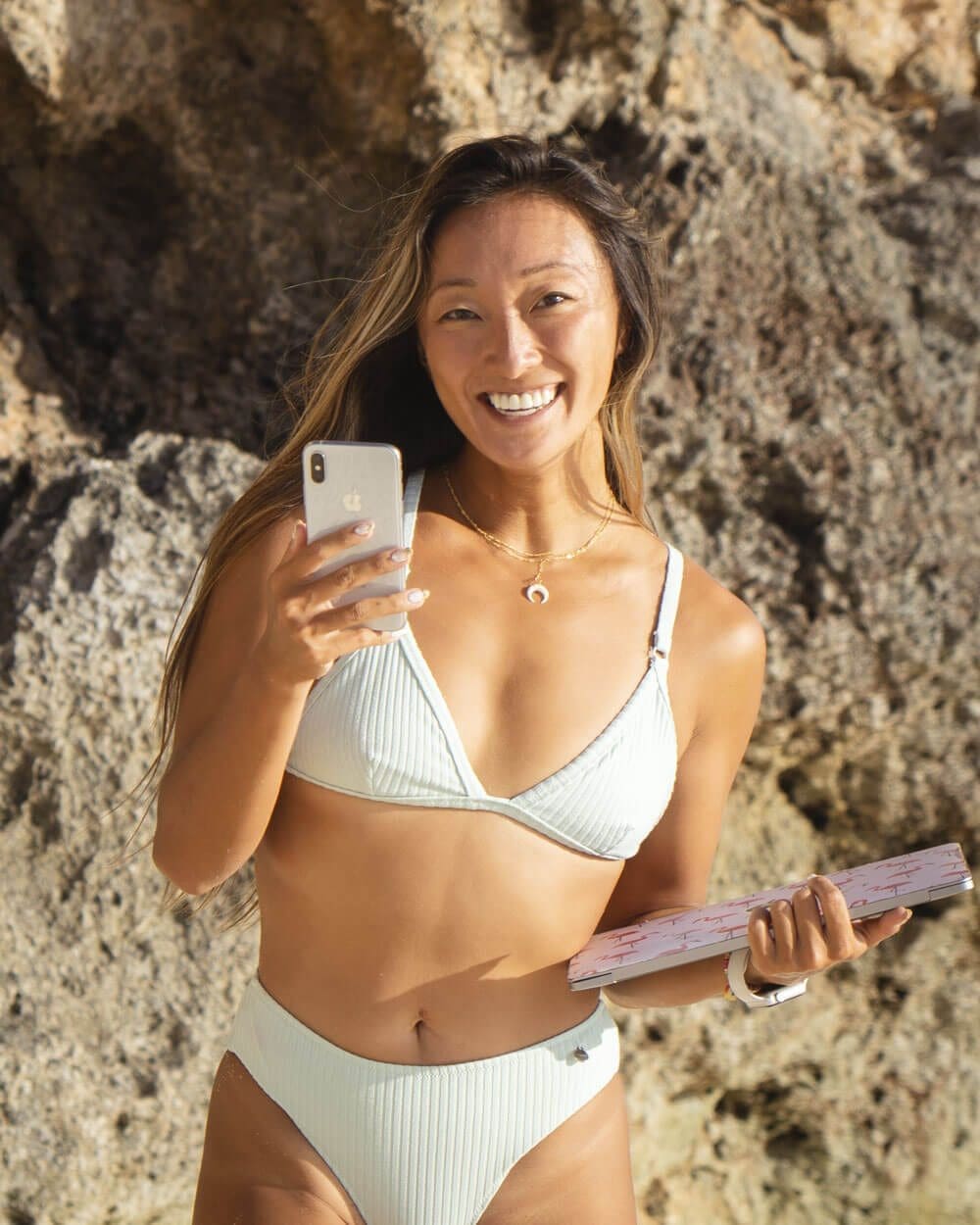Tune in or read the blog version below!
Quick Links
✧ Join the Digital Nomad Society for Just $7/Month
✧ Follow The Wanderlover Podcast on Instagram
Hello, everyone. Welcome to this week’s episode of The Wanderlover Podcast. I’m your host, Danielle Hu, and this week we have special guest, Linda Yi, founder and creative behind Panda Cub Stories. Welcome to the show, Linda!
Linda: Hello and ni hao! Danielle, it’s good to be here.
Meet Linda and Panda Cub Stories
Danielle: What is Panda Cub stories and what you are all about?
Linda: Yeah. So Panda Cubs stories started out as this bilingual web comic that I started drawing to track and encourage myself in my Chinese learning journey. So I’m Chinese American and I’ve been trying to be literate in Chinese for the better part of a decade, but I kept backsliding. So I started doodling, these little language comics, staring a Panda Cub to help myself remember the characters I was learning.
I started posting them on Instagram about a year and a half ago, and kind of two years ish later it’s grown into my business. So I am now kind of drawing structured readers series. So that helped my readers learn how to read Chinese alongside me.
Danielle: That is awesome, so close to your heart. Were you born in China?
Linda: I was, I was born in Sichuan, so it’s the Homeland of the giant pandas. And it’s like, it’s kind of a funny story. So I tend to go on very long winded stories. I’m going to try and like rein myself in. My mom’s lab used to like, so she was in the family planning kind of committee. So one child policy, all of that. So her research was in fertility. And so apparently when I was a baby, my mom’s lab was approached by the giant panda breeding center, or it wasn’t even the breeding center. It was just the Chengdu zoo at the time to help like figure out how to tell whether or not pandas were pregnant, because like actual Panda babies are like the size of rats. And so like, you can never tell if the mom is pregnant with like little pandas.
So my mom’s lab was like working with the zoo. And apparently when I was a toddler in China, I got to like, like touch a panda cub, which like would not happen now because like, there’s so many more restrictions in place. But back then it was just like, yep. They were there. My mom brought me there as like a two year old and I was like Panda! So, so yes. Long story short. Yes. I was born in China. I was born in Chengdu.
Danielle: And now it’s the name of your business. So were you able to express this creativity growing up as an Asian American? I really want to touch on the subject of just very traditional jobs and careers and the stable life that’s kind of almost ingrained into Asian American childhoods. So I’m curious about your childhood and expression of creativity.
Linda: So yes and no. I think I started scribbling with a crayon as early as I could remember. I was always drawing and I loved listening to stories. So I had these like Chinese audio book book on tapes that my parents would play for me. And there was, you know, sealed sea journey to the west. And then there was like Chinese Smurfs, like very random stuff that I would like listen to on loop. So apparently I started talking very early and I was a very verbal child.
And so those things kind of stayed with me after we immigrated to the states and my parents were really great. Like they signed me up for art classes. So I drew an illustrated and painted all through high school. But at the same time, it was very clear that art was something that was to be pursued as an extracurricular. Right. And it was something I put on my resume, but I, it was never really expected that that would be something I focused on. So I actually, like, I did not set my, like my art major until late to late junior year.
So I was always like minoring in art. And then I changed it basically my senior year. And I’m surprised my parents, I mean, I told them, but like it was, my dad really, really wanted me to be a doctor. Like even years after college, he was like, it’s still not too late to go back to school to go to med school.
Danielle: A very common narrative coming from Asian American households. And I feel like it takes more courage and more mindset shifts to be able to fully not only decide that you can do it, but go about doing it, which is what I admire so much about your business journey. It’s like coming from this childhood, coming from these almost limiting beliefs, but then shifting the narrative and being able to create something so beautiful. And you have like tens of thousands of followers, and now you are launching so many new products and services that are also going to help others in their Chinese learning journey.
Linda: Yeah. I think I’m very grateful to be where I am, but it’s like, it’s definitely been like HAFA and the excited field and like half the other foot in like absolute panic. But I, I think it’s really been the last two years that things have kind of converged. Because I think before I was, I knew what I wanted to do, but I couldn’t quite figure out how to make it my career.
Advice For Other Creatives
Danielle: hat would you, what advice would you give other creatives who maybe come from the same households don’t have that inspiration. They have like a burning desire to do something creative, but they just don’t know how to go about it. Maybe like where you were two years ago.
Linda: So I think I would describe myself as a dreamer, but also like a pragmatist. So I think I learned very early on that I didn’t want to, and couldn’t be a starving artist. And one of the things that’s very important to me is, you know, getting to a point in my career where I can take care of my parents and provide a good life for them once they’ve retired, well, they have already retired, but I’m giving myself a couple more years to, to kind of get, get at the level that I want to be at.
So I would say that I think it’s very important to recognize what you want to do early and invest both time and money into that as much as you are able at the same time. So one of my favorite kinds of creativity self-help books is Big Magic by Elizabeth Gilbert. And one of the things she says I really resonate with, which is, I think like a career in the arts is a little different from maybe starting a business in another area because yes, part of it is you’re creating a product and a service, at least for me, because like my company is at the intersection of art and education.
But like on the other hand, you’re also creating for the sake of creation and you’re creating to make the work that is, you know, like that is true to yourself. And so sometimes I think like attaching a dollar sign to that too early is tough, right? Because it might influence the type of art that you make. So I do think that it’s very important to figure out kind of a way to support yourself while you are creating the art that you want to create. I will say that I’m trying to think of how to summarize it.
So I think like recognize that it is possible, but also that it’s hard to just go it alone, which is something that I tried to do for like seven years. And I was like, I don’t know why I’m not making progress. So I think like, you know, reach out and find mentors both in your creative field, but also like if you’re treating this as a business, invest in programs, right. Like invest in courses, which is what I started to do about two years ago. And I think that’s really when I saw my social following grow because I was being more intentional and, and also yeah, signing up for business courses and the mastermind, like I’m, I’m in Danielle’s Mastermind for everyone listening. And that’s been really transformative.
Danielle: Linda is a rock star. And I love what you shared with the mastermind a few weeks ago about the mountain analogy. You know, you’re like we’re walking up a mountain and there’s multiple paths. And as long as everything that you, or do you want to explain it? I know. I mean, that, that was a very good, I think summary.
Linda: So I, I borrowed this piece of advice from Neil Gaiman, who is one of my favorite like creatives out there. Like he, he, he is just so amazing. So, and he’s also, so he’s primarily a writer, but he’s written across a lot of different genre and age ranges, which is eventually what I hope to also do.
And he started out as a journalist. So the advice he gave was, you know, like imagine where you want to be as your mountain in the distance, the end of your journey. And for him, it was to support himself with his words and his stories and for me to do the same, but to also, you know, learn and help others learn how to read Chinese while exploring Chinese culture along the way. And he talks about how, you know, like different opportunities will come or, you know, like you put it different paths, well present themselves and choose each path or choose each stepping stone.
If it’s leading you even a step closer to your mountain. And I think the interesting thing is, you know, this same opportunity at different points in your career can either be a step towards, or maybe a step back from your dream. Right? So like I, so I did work a non-creative job for a number of years back at my Alma mater at duke university. So I was in higher ed. I was a program administrator. It was very not creative in the sense, like, it didn’t have anything to do with art, but it did let me practice trainees.
I had to, you know, talk to a lot of partners and clients in China. And I traveled to China three times a year for my job. So for me, like that was one step closer to working at the intersection of the U S and China. And it took me closer to my mountain, even though it wasn’t right in the art world. So for me, when I was 25 and took that job, it was definitely a step towards the mountain. But I think like, you know, sometimes like now when I get scared, I’m like, should I go back into academia? Right. Like I could probably, you know, like resume my career track and just progress that way.
But I think at this point in my life, I’ve learned what I needed to learn from that industry. And it would, it would no longer be leading me. It would not serve the same purpose and it would not get you to the top.
Try Different Things
Danielle: I’ve actually recommended people reach out, and they’ll ask, I either don’t have enough money to start a side hustle, or I don’t know what to do. And I think it’s the same concept where like certain opportunities that may not be perfect, but they’re also not forever. So even taking on side jobs like babysitting or a barista just for a few months, so you can invest into what you really want to do long-term, it’s really important to think about what is most important for you at this time? Is it the time? Is it the money and invest every second of your day into pursuing what your ultimate vision is?
Linda: Yeah, no, totally. And that actually kind of made me think of, so between like starting, starting Panda Cub Stories, which I’ve been working on it semi full-time since moving to New York in 2019, I went to grad school for education and children’s literature. And then I actually spent about a year and a half in Durham, North Carolina, which is where I was living at the time, trying to figure out what I wanted to create.
So I wrote like a novella, I did like YouTube, I did a podcast. Yeah. I like made picture books. It was, it was a lot. Yeah. I was trying a lot, nothing quite felt like it was sticking, but what I did to support myself at the time was I was teaching part-time at a Mandarin immersion, preschool slash daycare. And, and I think like I had thought about, you know, like, do I get a job at the local coffee shop? Do I find like a retail job, which to be honest, would have paid better.
Preschool teachers do not make much at all, but like ultimately I chose the part-time job I did because it was much closer to what I wanted to do. Whereas I think working a job in retail or, you know, like getting my bartending license and like bartending at night were hostessing for me, wouldn’t have contributed right. To what I wanted to do. Whereas I think if you’re a writer, like I think working in the service industry is great because it puts you in front of so many people and you get to observe so many things. So I guess like another piece of advice would be like, if you are looking for a part-time job to support you and your art, try and be a little savvy about it, to see if you can have your cake and eat it too.
The Growth of Panda Cub Stories
Danielle: So how has Panda Cubs stories grown over the past two years? And let’s say I’m an audience member who grew up speaking Chinese and you can speak conversationally, but can’t read never really pursued it outside of what you learned as a child. How are you able to help them?
Linda: Yeah. So actually I’m really excited to be where I am now because I finally figured out right. An answer to that question. So before I was, you know, making comics, so it fell into two, three different buckets. So one were just like comics, I thought were funny. And sometimes they had Chinese in them.
(Sometimes they didn’t, but the web comic community on Instagram is great. And so sometimes we just like draw a slice of life, things to make each other laugh. The second type of comic that I draw are more culture oriented. So it’s like exploring, for example, the story behind Chinese Valentine’s states and those are really, really fun to do as well. And as someone who’s Chinese American, I feel like often there are things I think I already know, but then like when I’m researching for the comic, I’m like, oh wow.
Like there’s so much more here. And it’s yeah, it’s really awesome. And the third thing are Chinese language comics, which I, I think had spent basically two years trying to figure out the best format for teaching Chinese characters via comics. Cause I think like sometimes a visual can distract from the characters, which are already very visual. So I didn’t want to, you know, just put icing on something that wasn’t substantive. And this also draws a lot from my own background as a children’s literature, I guess I wouldn’t call myself a scholar.
I have my master’s degree, but all of the research I did with children’s literature as kind of an academic discipline and also a pedagogical tool is very well-crafted children’s books, use art and narrative to help write and bolster a child’s journey to literacy. It’s not the only thing it does obviously, but like that is a very important part of children’s literature. And so I sort of have drawn a lot from that to creating these comics that honestly, mostly adults read, I think like, you know, an advanced their grade and up reader can also read it, but most of my readers are like us, Chinese American adults, or they’re like people just starting their Mandarin at one oh one class. And so like literacy at a first grade level.
And so I’ve kind of arrived at a format where I’m teaching individual characters via small bite sized character entry comics, which I post to Instagram, just a very quick crash course on Chinese characters and how they work. When I was young, I hated going to Chinese school. It was very confusing. There are a lot of characters that look the same and sounded kind of similar. And then I would keep forgetting the ones that I memorized.
And when I started learning Chinese again, as an adult, what I realized that no one had ever taught me was that Chinese characters are either simple pictograms, right? That represent actual concepts or words like shun. The character for a mountain looks like a mountain, or they’re more complex characters pieced together from character components that either give you a meaning hint or a sound tent. So when I teach each character, I break it apart and teach it that way. And once you are able to master kind of the basic functional components, it’s so much easier to learn new characters.
And so after a set amount of character entry comics I’ll create like an actual longer, like, you know, web tune style story that uses the characters that we’ve just learned as kind of a reading practice. So basically what I’m doing now is every month I’m publishing an ebook that teaches a digestible, right.
I hope reading experience at the end. So people who subscribe to my reader journey or readers series while eventually be led to full literacy. So I’ve planned like 2,500 characters in total, how many characters are in each reader? So the first one is 10, but I think for future ones, it’ll start to snowball. And the first one is also like, this is how you use the reader. Here’s the walkthrough. So I’m planning on about 10 to 15 characters per reader and yeah.
Hopefully if I’m able to be more full time with Panda Cub stories, I’ll up the pace to maybe two or three liters per month for the same subscription price.
Danielle: That’s still very powerful. And just from experience, like for those of you listening, who may not be familiar with the Chinese language, there’s no alphabet. So it’s not like you can memorize 26 characters or 26 shapes and kind of read out a sentence, it’s purely memorization. So even like my mom sometimes she’ll make a grocery list and she’ll know like the vegetable she wants to buy and she knows how to say it, but then she forgets the character for it.
There’s literally no way in Chinese to be able to figure out what that character is, unless you’re like using the English alphabet to kind of use paying to spell it out. But in terms of Chinese literacy, that’s why it’s so difficult for Asian Americans like myself, because if you’re not constantly being exposed to those characters or trying to memorize them, or even had the education as an adult, it’s just like more and more on the back burner.
Linda: Yeah, no for sure. And I think like, you know, it’s so like my, my soapbox that I like to preach from, from my LA children literature days is actually, don’t really believe in hard divides between like this as a book for children.
Right. And this is an adult book and I think comics have bridged that generation gap for a long, long time. And anyway, I probably 50% of what I read is what tunes. So this is also going like this as a valid source of literature consumption. But I think like what a lot of program, like language, but also like Chinese language programs sort of either failed to realize or failed to address is, you know, like kids who grow up in China going to school, like yes, some of them learn 500 characters, right.
Like a year, a thousand characters a year. But that’s also because they are fully immersed in the language. And like, there is a lot of external motivation for like learning how to read that way. Whereas if you’re growing up in the states, like there’s no, I was like, I would rather read Harry Potter. Like I don’t need to learn all of these characters so I can read about how like the birds are chirping. Right. And so language programs really need to be stickier and more motivating. Right. Otherwise, like there’s no, like kids are smart.
Like they’re like, if this is unnecessary, I’m not going to do it. Whereas if it’s fun, then yes. Like I will try it. And I think as adults, we’re still the same creatures, right? Like we have a bit more, you know, elbow grease and like, well power. But at the end of the day, like if I’m tired from work or if I’m really hungry, like I would rather do something else than cracking open a textbook. And so what I really wanted to provide is something that is fun and kind of like, you know, like dorky and easy to start. Cause I think really starting is the hardest part of anything.
Panda Cub Diner
Danielle: And once you kind of get that first step done, then I don’t know, maybe you’ll open Duolingo and do like 20 minutes. And I think having the accountability and the community going back to what you said about children in China, like they need it to survive, but here not so much unless you’re visiting Chinatown or going to visit relatives, but I love what you’re currently working on. You have an idea to start something called the Panda Cub Diner and that’s going to combine menu ordering and also the community aspect and bringing everything together and having a group right of people learning Chinese. Could you speak more about that?
Linda: Yeah. So this is also an idea that has been growing for the past year. So I’m currently based in New York city and for the past year, you know, like all businesses have been hit really hard. Chinatown has really well, like all restaurants. Right. But like they’re trying to town, restaurant industry has also been hit really hard. And I think like there’s also been a lot of blow to morale with the anti, like the rise in anti-Asian violence.
So one, like one of the things that I’ve been trying to do is like either eat out or like order local and support the businesses that really make the city what it is. And at the same time, I think for me, just one of the things that has kept me tethered to Chinese culture is right. Like talking to my family. And when I am home, like gathering around the dinner table and eating my favorite dishes that my parents have made.
And so there has always been, I think, like this connection of food with language and culture, but then on the flip side, sometimes I’ll go to a Chinese restaurant and I’m like, oh, I don’t know this one, one character like here. So, so I am not going to order that, but then I’m like, I’m Chinese American. So I don’t want to order it in English. Like you, you absolutely could. But like, I think there’s still sometimes like that sense of like, oh shit. Like, and so I am kind of dorky. So sometimes like for my favorite restaurants, I’ll make like a pinging cheat sheet and I’ll be like, okay, these are all of the things I know I want to work.
And now it’s kind of like, it’s easier. And I know it because I’ve gone many, many, many times. Yeah. And, but I think like now that I’ve been working on Panda Cub stories and I’ve been thinking about, you know, how can I better support my readers because with a web comic and with the readers that I publish, like there is no opportunity to practice speaking. And there isn’t that much opportunity to practice like listening comprehension. So the idea for the Panda Cub diner is for it to be New York city specific at first.
And it’s going to be a month long program where people who sign up will go out to Chinatown twice for group dinners. And then every other week I’ll also host a group dinner. If you can make it physically at my studio in the upper east side. And it’s been really fun. I’ve been like decorating it with the intent of having people over too. And so, yeah, so the idea is it’ll be kind of a really fun shell down to earth, but also delicious four week program where we come together for four dinners.
But throughout it, it will also kind of teach you how to order the dishes that you want. We’ll kind of sample four different types of Chinese cuisine. So it’s my favorite, which is the twenties. Cause that’s where I’m from. But obviously there are also like, you know, more Southern flavors or like CN famous food flavors, right. And kind of at the end, hopefully everyone will be able to have like a curated list of like menu items that they know how to order and are confident in ordering. I’m also planning on maybe doing like a mini cooking workshop in my house, like teaching people how to make like chili oil.
And it’ll kind of be this fun community that is like full of, I don’t know, happy, heart’s happy stomach, but we’ll also be practicing, practicing Mandarin.
Danielle: And I love How everything is seemingly coming together. So effortlessly, like all your experiences, teaching kids, like working with kids, learning how to, you know, really learn this language at an early age and then transitioning all of your skills to adults. Like people who crave that same learning experience, but just later on, and now all of these vehicles for people to enter into your world and get a taste of what it’s like learning Chinese through comics and being like, oh my God, this works. I can totally follow that. Instead of following the traditional Chinese books that just force you to repeat a hundred characters in like a week. And now it’s like, you’re adding the community aspect and it’s just growing so, so beautifully.
Connect With Linda
Linda: I’m very excited about it.
Danielle: How can listeners connect with you?
Linda: So for social media, my main platform is Instagram. So my handle is at Panda Cub Stories. And you can also visit my website, which is pandacubstories.com. And so I have a reader preview there. If you want to get a better look at what that entails, but overall, I would just love to hear from you if you want to pop in and say hi.
Danielle: Linda, you are such an inspiration for language learners around the world, But also for creatives, you are the prime example. It is totally possible to pursue your dreams and to have every aspect of your life. Like even the food can be integrated into your business. So thank you so much for coming on the show.
Linda: Of course. Thank you so much for having me.
Danielle: Bye guys. I will see you next week!
If you’ve enjoyed this episode, it would mean so much if you could leave a review on Apple Podcasts. This helps us spread The Wanderlover mission to those who need a dose of inspiration today, thank you!
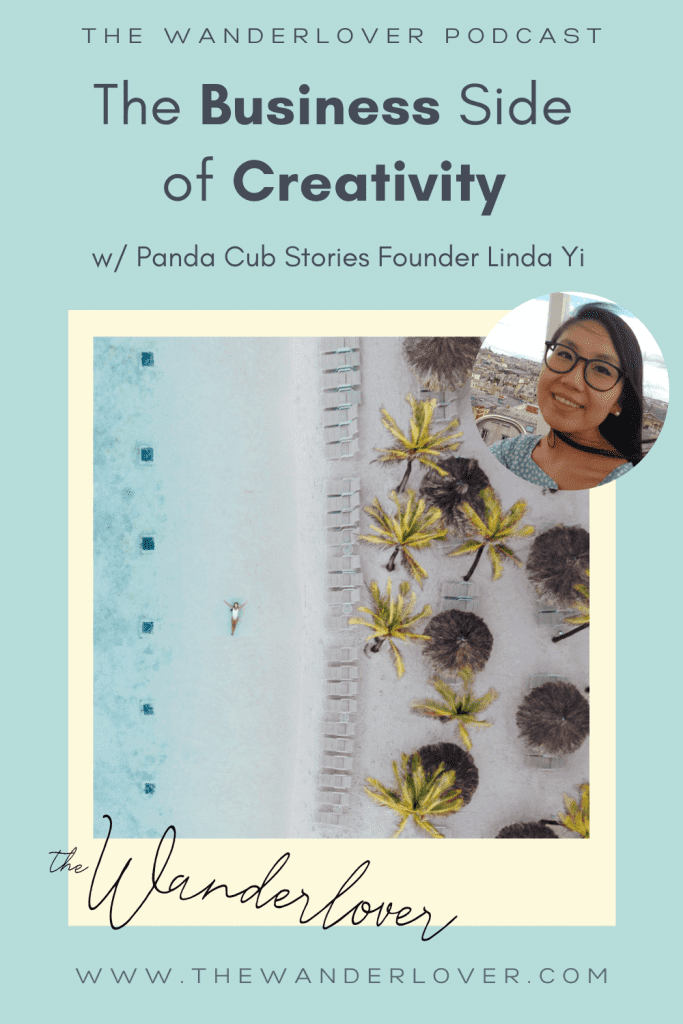
Read Next
How to Use a Passion Planner and a Look Into Mine From This Year!
ThriveCart Review. Why I Love It & You Should Too
My Top 5 Reasons You Should Use ActiveCampaign in Your Business
How to Set Quarterly Goals: My System for Massive Success
My Sales Process and Discovery Call Script
How to Create an Online Sales Funnel
Motivation Tips for Entrepreneurs
How to Overcome Shiny Object Syndrome
2-3x Your Business Revenue Using These 5 Strategies
How to Price Yourself: Tips, Tricks, and Common Mistakes
